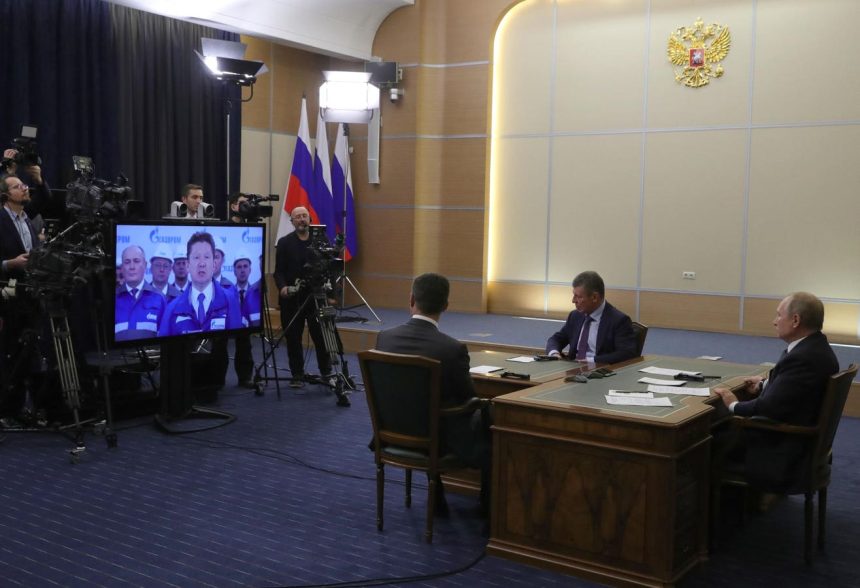The global energy landscape is undergoing a seismic shift as Europe disentangles itself from its long-standing reliance on Russian natural gas. This decoupling, accelerated by Russia’s invasion of Ukraine and subsequent geopolitical tensions, has profound implications for both Europe and Russia, reshaping energy markets and creating new vulnerabilities and opportunities. Russia, once the dominant supplier to Europe, now faces the economic and political consequences of losing its largest market, while Europe grapples with the challenges of diversifying its energy sources and securing its energy future. This transition, marked by increased competition for resources and a shift towards liquefied natural gas (LNG), has far-reaching global consequences, impacting energy security and market dynamics worldwide.
The swift decline of Russia’s influence in the European energy market began in late 2021 with Gazprom’s deliberate reduction of gas supplies, triggering a price surge that foreshadowed the larger crisis to come. The invasion of Ukraine in 2022 cemented the rupture, leading to sanctions, sabotage of key pipelines like Nord Stream, and a rapid decline in gas flows to Europe. By 2024, pipeline flows had plummeted to a fraction of their pre-war levels. The European Union responded with initiatives like REPowerEU, aiming to eliminate dependence on Russian fossil fuels entirely by 2027. This rapid diversification involved securing alternative supplies of LNG from countries like the United States, Qatar, and Norway, providing short-term relief but also exposing Europe to the volatility of global LNG markets and increased competition from Asian buyers.
Russia, facing the loss of its crucial European market, has turned its attention eastward, primarily towards China. However, this pivot to Asia presents its own set of challenges. While China’s growing industrial demand for natural gas offers a potential lifeline, Beijing’s energy strategy prioritizes diversification, balancing domestic shale production and LNG imports alongside Russian pipeline gas. This calculated approach limits Moscow’s leverage and prevents it from fully recouping the lost European revenue. The protracted negotiations surrounding the Power of Siberia 2 pipeline, a key project for Russia, exemplify China’s dominant position in these negotiations, demonstrating its ability to dictate terms and control the pace of development.
The global LNG market has become a key battleground in this evolving energy landscape. Russia’s ambitions to expand its LNG production and exports are hampered by sanctions targeting critical technologies and infrastructure, hindering its ability to compete effectively. Meanwhile, the surge in LNG demand from Asia, particularly from China, is tightening the global market, creating price volatility that affects both Europe and China. If China prioritizes LNG imports over Russian pipeline gas, it could further escalate global prices, putting pressure on Europe’s energy transition efforts and potentially undermining its ability to affordably secure alternative supplies. This interconnectedness highlights the global nature of the energy market, where regional shifts have ripple effects across continents.
The ramifications of Russia’s eastward pivot extend far beyond Europe and Asia, impacting global energy security and market dynamics. The situation underscores the inherent vulnerabilities of over-reliance on single suppliers and reinforces the importance of diversified energy strategies. Europe’s accelerated shift towards renewable energy and China’s cautious approach to Russian gas are reshaping the global energy map, creating a more fragmented and decentralized market. This transition, while necessary for long-term stability, introduces new challenges, including increased competition for resources, price volatility, and the potential for market fragmentation.
This new energy order demands adaptability and strategic foresight from all stakeholders. For Europe, the key lies in balancing the immediate need for energy security with the long-term goals of sustainability and reducing reliance on fossil fuels. China, on the other hand, must navigate the delicate balance of securing its energy needs while maintaining its strategic leverage over Russia. For investors and policymakers, the message is clear: diversification and adaptability are crucial for navigating the complexities of this evolving landscape. The ability to anticipate and respond to shifting market dynamics, geopolitical tensions, and technological advancements will determine success in this new era of global energy. As the world adjusts to new supply routes, evolving geopolitical alliances, and the imperative of decarbonization, those who can effectively navigate this complex transition will be best positioned to thrive.



